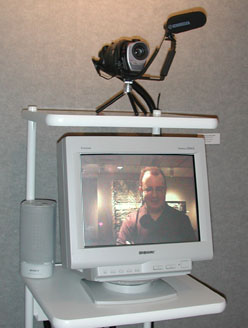
[(memory house)]The examination of memory is often conflicted between the concept of the mind's tremendous space of memory, and the ephemeral qualities of the memories themselves. While Emily Dickenson wrote that "the brain has corridors surpassing material place," Lord Byron added that "it is singular how soon we loose the impression of what ceases to be constantly before us."Memory House is an exploration of the interaction between people and a computerized representation of memory, one that seems perfect, but like our own memory, sometimes it is not. A motion-sensitive video surveillance system records short clips of video when viewers are in front of the installation. The clips are recorded on to a hard disk. Hundreds of video clips can be recorded on the system.At the same time that clips are being recorded, random selections of previously recorded clips are played back on a monitor. Viewers see memories of past viewers, with ethereal audio of previous memories mixing with the new.Our memories are not always perfect. Among the remembrances of "Memory House", there are some clips that are pure hallucination, false memories that are slightly provocative, but possible enough to be mistook for real ones.Memory House was featured in the "Digital Links" exhibition Sept. 30-Oct. 18, 2002, Paul Peck Art Building, Montgomery College, Rockville, MD.
|
